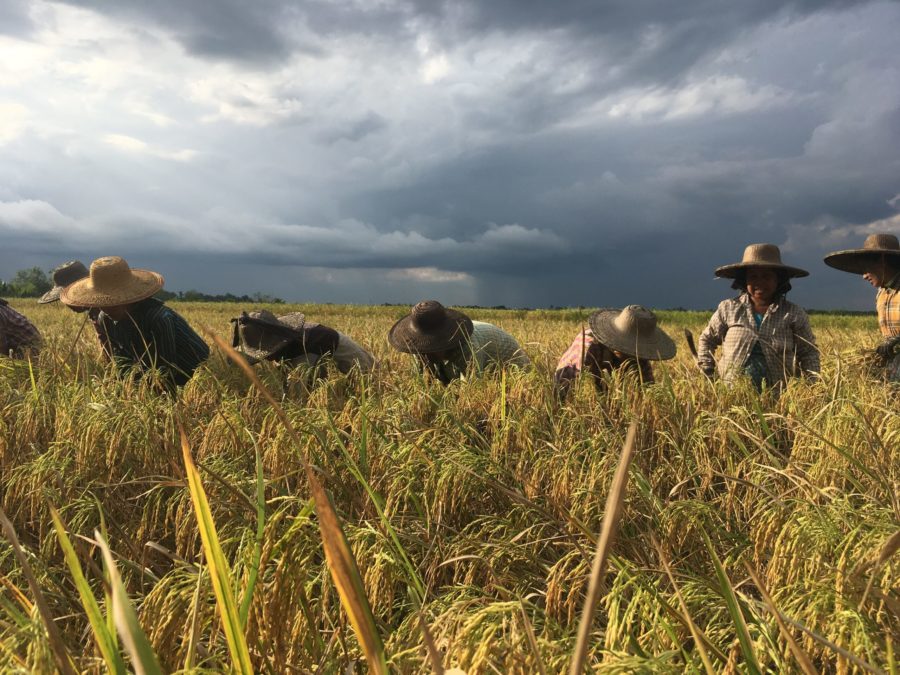Katharina Münster, Junior Specialist for Communications and Digital Innovation at the Inclusive Business Action Network, discusses the power of inclusive business to empower smallholder farmers across the globe.
“How do we bring workable technologies to the farmers who really need them?”
That is the question that guides David Chen’s mission. As the co-founder of Golden Sunland, he helps to run an enterprise that sources rice from smallholder farmers in Myanmar while providing them with hybrid seeds, trainings, and credit opportunities. “Our seeds increase yields by 30 per cent”, he says. As a result, farmer incomes have grown by the same factor. The company itself buys the products and markets them directly to consumers.
Golden Sunland is an example of an inclusive business – a concept that has gained traction among policymakers and impact investors worldwide.
Within agriculture, inclusive business is a powerful model to support smallholder farmers and can also improve food security. By including people with low incomes into their value chains, inclusive businesses can drive sustainable development and help lift people out of poverty. To make profits, inclusive businesses also need to be scalable, which makes them attractive levers for development. They provide jobs, goods, and services to people who would otherwise struggle to access them.

Inclusive business is a powerful model to support smallholder farmers and can also improve food security, writes the author. Photo credit: Unsplash
Inclusive business and rural development
Inclusive businesses operate in a wide range of sectors within our food systems and can play an imperative role in making them more sustainable. Among others, they can empower smallholder farmers, who are vital to ensuring food and nutrition for millions of people. But often, they themselves lack access to services and tools such as modern technology or markets.
To tackle this issue, Nature’s Nectar trains Zambian farmers in honey production and provides them with sustainable beehives. To reach high-end markets, it tracks every honey pot from farm to table. This enables it to offer premium prices to the farmers. “Our goal is to reach a market segment that is willing to pay an even higher premium for the impact on farmers,” says co-founder Katherine Milling.
Inclusive business companies help farmers produce more, invest in their farms, and market their products. So why aren’t there more inclusive businesses, and what can be done about it? To increase the number of inclusive companies, there are three key changes that are needed.
Three steps to support inclusive businesses
The first is about facilitating access to investment. In theory, the money is there. In 2021, the market for ESG (Environmental, Social and Governance) investing alone was estimated at 120 billion dollars. However, many investors struggle to find companies that are both impactful and profitable. Investment readiness training or business coaching helps rectify this issue on the company side. In addition, policymakers can help de-risk investing in inclusive businesses.
This process cascades down – providing funding to inclusive enterprises enables them to help secure it for their client base in return. In Indonesia, the inclusive business HARA trains rural women as “Agripreneurs”, who provide training to female backyard farmers and collect data on their operations. “HARA then coordinates with banks and insurance companies, which use this data to offer financial services to the farmers”, explains founder Regi Wahyu.
Among other things, this enables farmers to buy inputs on credit – a huge step forward, since most banks consider smallholder farmers as un-bankable. At the end of last year, HARA worked with 5,000 women farmers and 1,800 Agripreneurs. Each year, the women have increased their incomes by 80 to 90 per cent. The company itself is profitable: it takes commissions and markets the crops.
The second key change is to create policy incentives. In many countries, political and regulatory hurdles exist that hinder the development of inclusive businesses. The owners may not find a fitting legal form to register their inclusive business, for example.
Meanwhile, institutional investors are often constrained to maximize only returns. This makes it harder for inclusive businesses to access finance. Some countries are already trying to change this. Cambodia, for instance, launched an inclusive business accreditation process in 2021.

Cambodia launched an inclusive business accreditation process in 2021. Photo credit: Unsplash
Finally, we need to spread awareness. Most people have never heard of the term ‘Inclusive Business’. To change this, we need to spread the word. At the Inclusive Business Action Network (iBAN), for example, we launched a free e-learning course on Inclusive Business. It helps students, entrepreneurs, and policymakers gain basic knowledge on the concept. A second, more detailed course is in the making.
Also, we invest in highlighting the existing inspiring entrepreneurial journeys of inclusive business entrepreneurs globally. The result is an innovative storytelling series called ‘Inclusive Business Impact Stories’. Have a look and enjoy learning more about Inclusive Business!
Inclusive business holds the promise to elevate smallholder farmers, furthering their capacity to bring food and nutrition to people all over the globe. To truly harness the potential of the concept to empower smallholders, we need to raise awareness of the benefits of inclusive business.
Editor’s note: iBAN is interested to hear from any readers about what experiences they have with Inclusive Business. Readers can share their thoughts and insights via [email protected] or post them on LinkedIn (#InclusiveBiz). The latest issue of iBAN’s online magazine CLUED-iN explores inclusive business and food security.
Header photo: Golden Sunland (© GIZ / Susann Tischendorf)



